"AI is not replacing people – it's helping make workflows more efficient"
Alexander Goldybin of Code Maestro on creating an AI coding assistant built specifically for game developers.
Welcome to AI Gamechangers! We’re a little late with this edition because of a trip to Shanghai for PGC, CIGDC and ChinaJoy, where we discovered, with some amusement, that “AI” sounds like the Mandarin word for “love” (“爱”).
Anyway, this is your regular newsletter spotlighting the practical ways AI is reshaping the games industry. This week, we speak to an industry veteran who’s building an AI assistant for the next generation of game developers. Unlike generic programming tools, Code Maestro offers deep Unity integration and can process massive codebases – even projects with dozens of gigabytes of code and assets. If you’re wondering what a true “coding copilot” might look like for gaming projects, this conversation’s for you.
As always, scroll to the end for some additional news and links, including GPT-5 and Genie 3 releases.
Alexander Goldybin, Code Maestro

Meet Alexander Goldybin, a serial entrepreneur with over 25 years in games and tech. After creating one of the world's first Flash-based MMOs and serving as CEO of MY.GAMES Europe, Alex founded Code Maestro, an AI coding assistant specifically designed for game development. Already, 15 studios are using the software as early adopters. You can see it in action on the official YouTube channel.
Code Maestro is currently fundraising, with five angels already on board (senior executives from Unity, Meta, Google, Outfit7, and the founder of Zephyr Mobile, recently exited to Tripledot) and several soft-committed funds, which are now waiting for a lead investor.
Top takeaways from this conversation:
Code Maestro is an agentic AI copilot built specifically for making games. It can process massive game projects with full understanding of complex architectures that confuse generic AI coding tools.
Game-specific AI tools outperform generic ones because they're optimised for industry workflows.
On-premise deployment is a key USP, enabling security-conscious studios to run AI workflows locally without uploading code to the cloud.
AI enables rapid gameplay experimentation, allowing developers to quickly test gameplay elements and iterate on ideas. The long vision is to democratise game creation, enabling even non-coders to prototype playable games.
AI Gamechangers: Please tell us about your journey to this point.
Alexander Goldybin: I've been in games for 25 years now. I started in the early era of browser-based gaming. I actually created, to my knowledge, the world's first Flash-based MMO game playable in a browser. It was a strategy game heavily inspired by Starcraft, Warcraft and lots of other strategy games, which I totally loved. It became really huge for many years in Eastern Europe and CIS: it ranked in the top two or three games. The concurrent users were at the level of 20,000, which was really huge at that time. We had a really hard time dealing with all that stress on the servers!
Then I decided to exit the company, sold my shares, and became the first CEO of MY.GAMES Europe, a huge company. In its early era, we built up from scratch this entire subsidiary for European operations and publishing. Then we extended to the Middle East, specifically Turkey, and then we also had extensions in North America and South America.
We had an IPO at the London Stock Exchange two years after I joined. That was more of a matter for the headquarters. It became extremely boring, very frantic, and it was just awful. I no longer felt that I had my own startup. It was more like being just a small part of a huge machine. So I decided to leave the company; at least I could sell some shares and have a nice, small golden parachute.
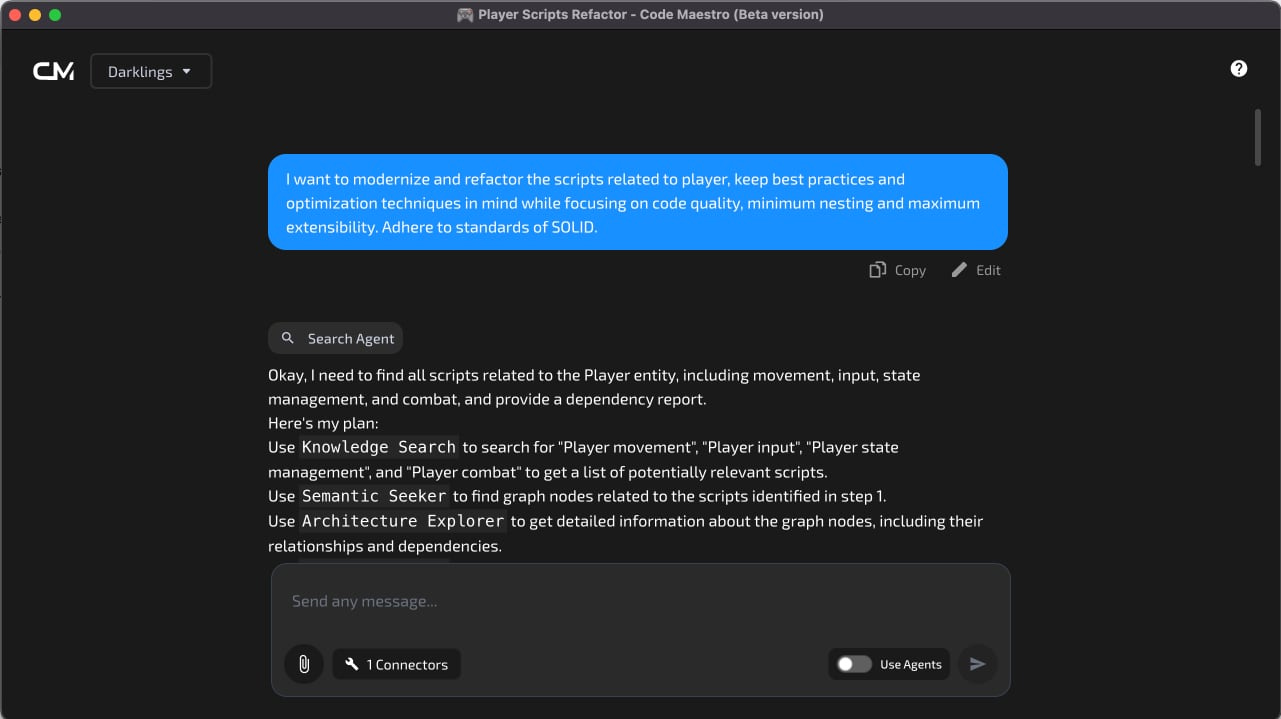
I co-founded the company iLogos Game Studios, which was mostly involved in providing services and co-development. We worked with big players across the globe, like Tencent, Playrix, Wargaming, Zynga, Epic Games, lots of them.
We settled that, and I thought, “What could be my next cool thing?”. I also wanted to dive into the AI space.
What has your journey into AI been like?
About eight years ago, I went really deep into it. I learned Python and decided to learn TensorFlow, PyTorch, all the cool frameworks, and also the scientific stuff behind them. I attended scientific conferences like NeurIPS, ICML, and ICLR.
I did lots of different prototypes. I also saw that, unfortunately, game studios do not want to share their data easily. It was a major prevention factor for many of my ideas and prototypes. We saw it's impossible to make this product if companies are not willing to share as much data as would be required for that.
“I was a coder in the past, and I see that this vibe coding thing is really cool. I have now coded a lot of small games with different gameplays, just experimenting. I know that it's a great way to test new gameplay ideas”
Alexander Goldybin
Finally, we ended up in this new hype of gen AI!
We experimented, even before that, with GANS, to see if we could create some art tests based on GANS. It was of terrible quality. Some stuff worked a bit (like portraits of avatars and some items), but it's completely incomparable with what's possible now with diffusion networks. We had to decide whether to really go into the art side or to focus on coding, and we decided that the coding side looked much more interesting. AI complements and enhances the coding side, so human coders can work more productively. They can work better and faster, and skip some tedious work.
We created Code Maestro as a company and started R&D about one and a half years ago. We went through lots of iterations, optimisations, and so on. What we built as the first version of Code Maestro was comparable to Cursor and GitHub Copilot. Basically, it was mostly usable as plugins from Rider, from Visual Studio.
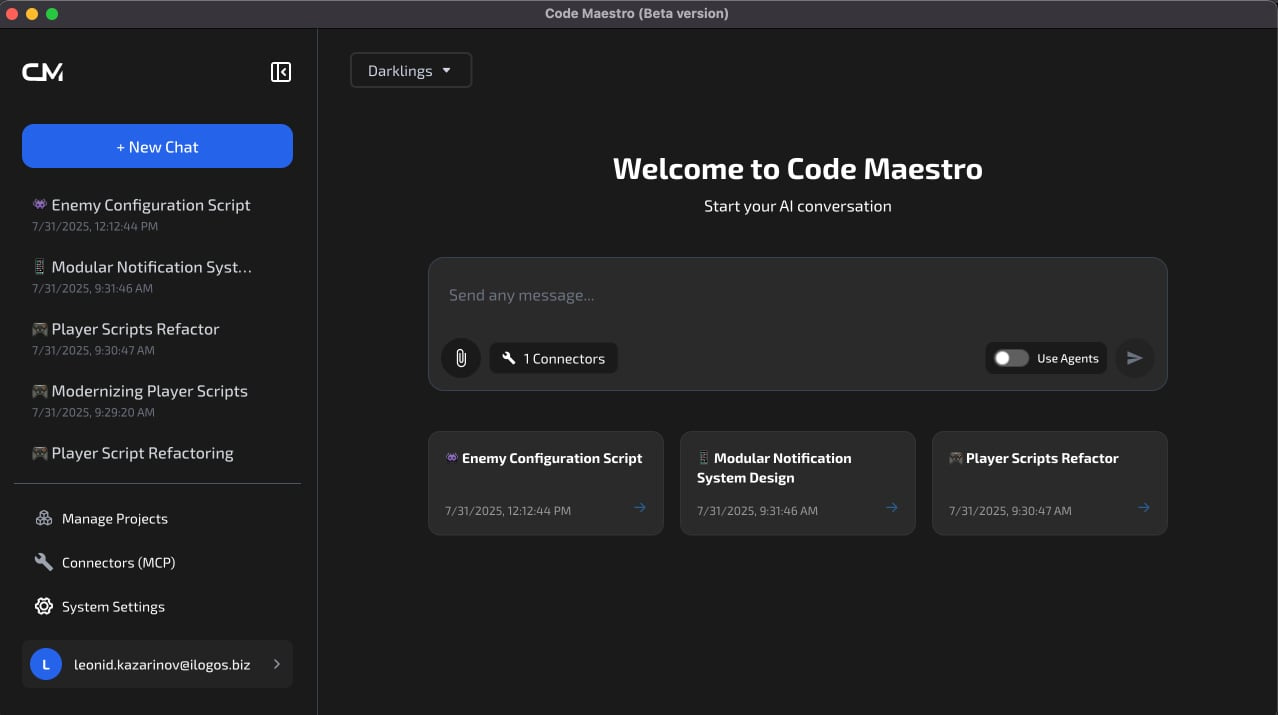
From the get-go, we had a web UI, which was very comparable to ChatGPT. We still have it, but it's no longer the focus. We progressed towards the agentic stuff because now the whole world turns on agentic systems, and we followed that path. It's very obvious, but it also makes total sense. And now we also have our own desktop app, which is about to be released very soon. It's in final beta testing, and it's a massive game-changer, because we have lots of connectors there.
Unity was our first connector, which is highly polished. Code Maestro can take actions in Unity; chain tasks, analyse the console output, fix errors, run profiler, run debugging sessions, report if there is something wrong, and try to fix stuff automatically. Lots of things can be chained. We're working on getting steady workflows in place so every Unity developer will be totally happy.
We are also in the early stages of Unreal Engine support. But we wanted to first make the best Unity integration and then progress into the Unreal Engine world. That’s a bit more complicated, in terms of the context, understanding of the project and so on. Lots of things in the Unreal world are binary files, not the more readable assets for Unity. Lots of Unity assets are readable assets like XML files, essentially, so it makes it a bit easier.
“Part of our daily job is to educate the market. We do a lot of education in the way that we work with the community. We show use cases and how AI can be applied. This is just the beginning”
Alexander Goldybin
The context engine is actually something which is definitely very deep tech on our side. We can fully digest and process even huge repositories like multiple dozens of gigabytes in size. We can even process hard-to-comprehend architectures in Unity (for example, dependency injection). It can be hard to understand, because it looks like a bunch of files which don't seem to be connected at all. But we can fully make sense of all that. This context engine is also highly optimised towards speed, so we can provide answers almost immediately. We can be hyper fast, and also very precise.
Of course, we do tests by comparing ourselves to GitHub Copilot first, or Windsurf and some other competitors, and we always win. So our quality of answers and the speed, and now also the agentic flows, they're just better than any other “generic” copilot which is also on the market.
What technical challenges did you overcome to be able to handle that huge context?
For that, we have several types of data storage based on different schemes and different principles, and we have multiple iterations of the indexing. First, we have almost immediate indexing. It’s hyper fast, taking between 10 and 30 seconds usually. That's the immediate first impression of the project. Then we have multiple passes of iterations, more and more hardcore, better and better understanding of what's actually under the hood in this particular project.
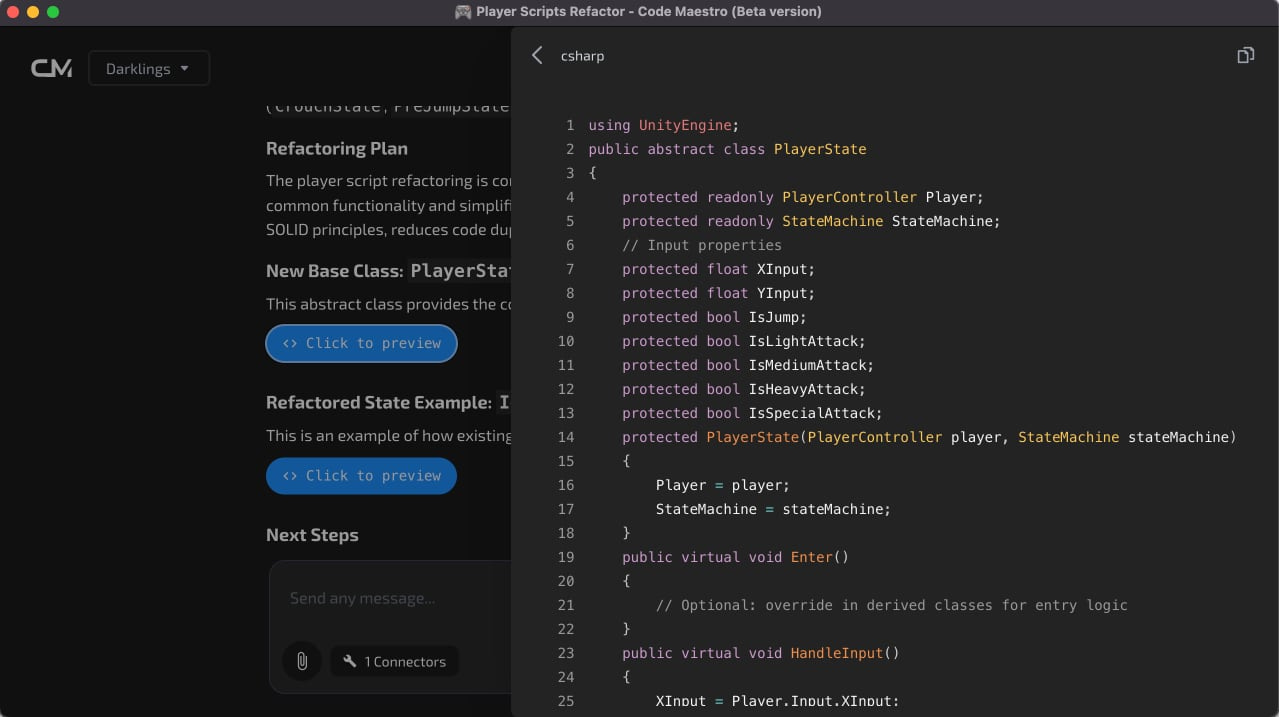
Getting all the codebase files right, getting the assets files right, understanding how they interact – that’s very important. So, for example, which scripts are attached to which components or how the prefabs are being organised, all that stuff, which is extremely important to understand in its entirety, we can understand it. For a big project, this whole indexation can take many hours. For a project which is, let's say, 50 gigabytes of code and assets, it can take approximately 10 hours or more until this entire indexation in multiple passes, in multiple stages, is completely done.
Who is your ideal client? Are you aiming Code Maestro at hobbyists and indies who are vibe coding, or are you seeing it as something that could be used in a triple-A studio?
We are aiming towards the entirety of the professional and semi-professional game developers, not necessarily hobby developers who are just starting out. That's not our main focus, but every kind of professional.
“What makes us different is that we are highly optimised and highly focused on game development, so our entire agentic system is tailor-made and customised towards this exact use case. Other tools are not; they are generic”
Alexander Goldybin
For example, now we have 15 game studios as our early adopters. There are some really well-known companies like ZeptoLab, for example, the creators of Cut The Rope, and some others. The studio itself can be anything: a mobile studio, a PC games company, a console-focused company, whatever. We don't make any kind of separation there. The only thing which matters is the game engine they're using, and for now, we fully support Unity.
Studios are very protective of their data. They may resist uploading their data to a remote location for processing. How do you work with studios that want to do all their AI work in-house?
We decided from day one that we needed to have an on-premise hosting solution. It's one of the USPs of Code Maestro that it's possible to host all the sensitive data on the client side. It means the entire repository, all the codebase assets, all the project files, plus the knowledge databases which are being created, can be totally hosted on the client side.
The only thing which we are not yet allowing to be hosted on the client side is the core engine of Code Maestro itself and the LLMs we use.
But even for that, we have a solution in mind for the biggest companies, companies like Xbox Game Studios or Ubisoft. We could provide a complete on-premise hosting solution with everything. But this is a little bit more challenging, and for that, we would require that such a big customer fully commit to using Code Maestro, with some nice contractual sums in terms of the subscription.
Are you dependent on a particular foundation model?
The good thing is we're not dependent on any particular foundation model. In fact, we're constantly comparing all of them. It's an ongoing process. From day one, we used a whole bunch of different LLMs for different purposes. They're also totally interchangeable. We can switch from commercial ones to open-sourced ones and vice versa in a matter of hours. It's something that is highly desirable in our case, because we definitely don't want to be fully dependent on, for example, ChatGPT or Gemini.
What does Code Maestro offer that’s different from the other tools out there? How do you see yourself in the ecosystem that includes Cursor, GitHub Copilot and so on?
It's better to answer that in stages. When we started, none of the other tools, neither GitHub Copilot nor Cursor, could support this full-project understanding. It was actually not given at all. In the early stages, we were pretty much the only tool to my knowledge that fully supported this whole context understanding.
Those tools progressed in this regard, but they still can’t understand assets, mostly. Sometimes just tiny bits of them. But they can at least now understand the codebase quite well, depending on the use cases and architecture. If there’s a dependency injection, they will have a really hard time. So for them, it's just a bunch of classes and a bunch of files with no interdependence whatsoever. Aside from that, they got progressively better in understanding more than a single file, parts of the project, more and more of the codebase and so on.
With that in mind, we also had to adapt and become better. What also makes us totally different is that we are highly optimised and highly focused on use cases for game development, so our entire agentic system (and, of course, this context engine and so on) is tailor-made and customised towards this exact use case. And those previously mentioned tools are not; they are generic. They are for every kind of software development, be it back-end or front-end. So this makes a big difference.
“We're not dependent on any particular foundation model. In fact, we're constantly comparing all of them. It's an ongoing process. From day one, we used a whole bunch of different LLMs for different purposes. They're also totally interchangeable”
Alexander Goldybin
Also, our connector to Unity is highly advanced. There are some open-source connectors on GitHub for Unity, but they usually lack some advanced features. They are not optimised for big projects – they're essentially hobby connectors. They’re not bad at all. I'm not saying anything negative about them; it's great that there are such open-source contributions. But those connectors lack the depth required by professional game developers.
In total, I would say what makes us much stronger than the competition is that we have this proprietary, highly tuned, super-optimised context engine; then obviously our highly sophisticated, fine-tuned agentic system for use cases which are definitely all related to game development. Connectors such as our own Unity MCP connector are optimised. And the performance from all of that is significantly higher than if a developer used a tool like Cursor or GitHub Copilot.
Can you tell us a little more about the human in the loop when it comes to using Code Maestro tools? And being slightly more philosophical, what happens to human jobs when AI can do so much for game development? Please tell us how you answer people who are resistant to using AI tools at all.
We see that some developers are very hesitant to use AI tools because they fear losing their jobs. They don't want to change; they're very conservative sometimes. Or sometimes they say, “It's bullshit – the quality of AI stuff is very low, the code is low quality…” There are lots and lots and lots of such arguments.
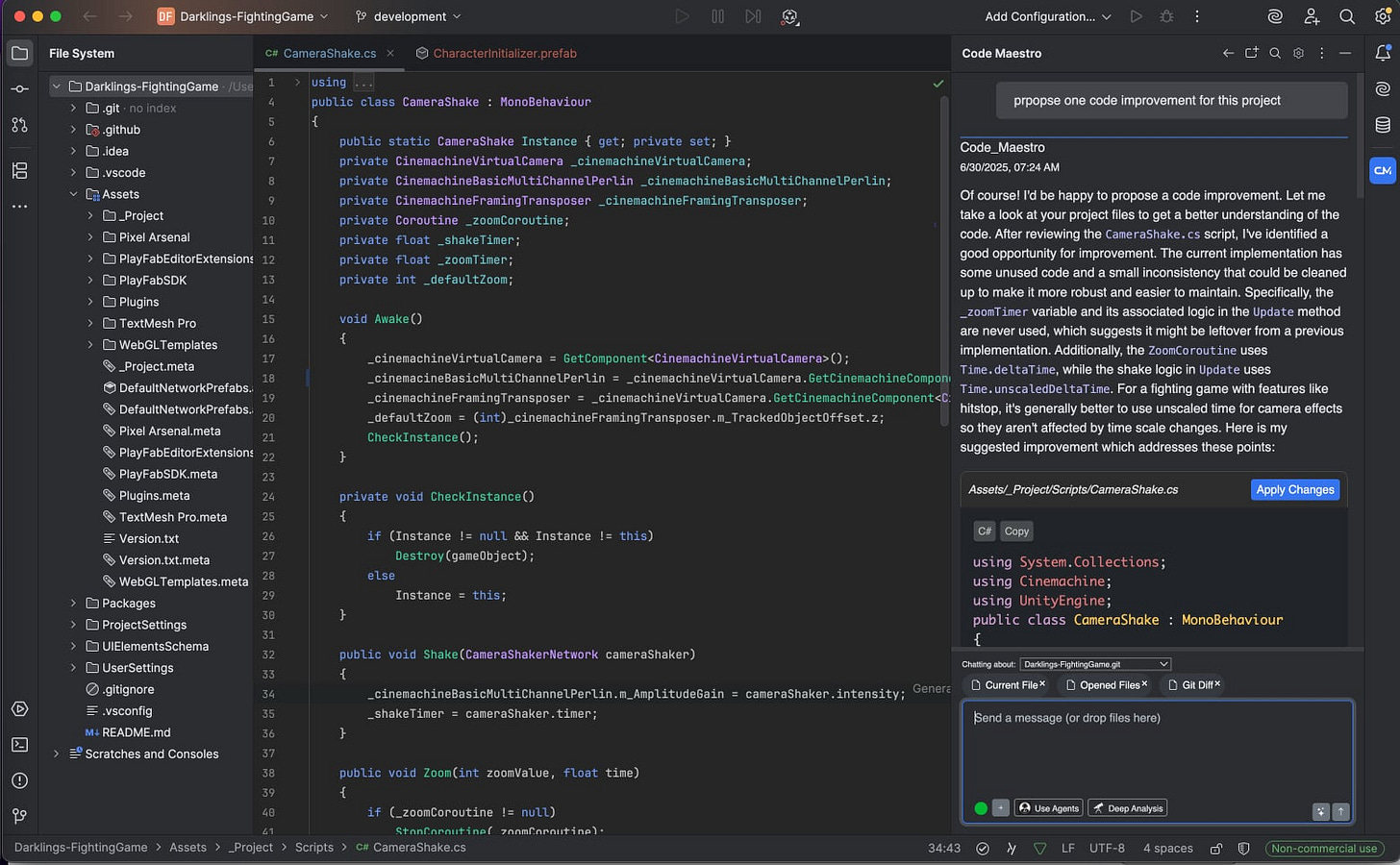
So part of our daily job is also to educate the market. We do a lot of education in the way that we work with the community. We show use cases and how it can be applied. This is just the beginning, and we want to roll out a much bigger educational campaign.
Regarding the human in the loop, we offer two modes of operation. The initial mode is the copilot mode, which means that a developer can just play ping pong with the system. It's called Milestone: ask questions, get the answers. Obviously, there is a function to apply changes immediately, so he or she can just click on the “apply changes” button, and the code itself will be modified. There is also a nice preview of this in the Git window, so that a person can be very sure that the code will be according to their wishes.
The other mode is more like vibe coding, so that the agentic system can itself do lots of things: chain the commands, chain different tasks. It’s also great, it just depends on the ideal way this particular developer envisions working with the coding models. Is it more a “copiloting” mode or more an “autopiloting” mode? We offer both.
“We have almost immediate indexing. It’s hyper fast, taking between 10 and 30 seconds usually. That's the immediate first impression of the project. Then we have multiple passes of iterations, better and better understanding of what's actually under the hood”
Alexander Goldybin
I was a coder in the past, I have a Master's degree in computer science, and I see that this vibe coding thing is really cool. I have now coded a lot of small games with different gameplays, just experimenting. For example, I took the gameplay of Snake and combined it with the gameplay of Flow, and the final game was actually really fun to play! It was done completely by the machine, with zero human intervention. And I had my own version of “anti-gravity Tetris”, going from bottom to top, and also the shapes were constantly mutating. Every two cleared lines, there was a new shape, and it got progressively faster. So I know that it's a great way to test new gameplay ideas.
It's not yet possible to vibe code something like Starcraft 2, or Age of Empires, or something like Call of Duty! Completely not possible. But to test gameplay ideas, to try “atomic gameplays”, and just see if they are fun to play, it's a really awesome tool.
Once again, it really depends on your desired outcome: full autopilot mode or copilot mode. It's really based on the preferences of the user, and our goal is that everyone feels really comfortable with that.
Regardless of the preferences, the only issue is that the market itself is somewhat uncertain. Is AI good or bad? Will it steal some jobs or not? There is uncertainty, and we all know that there are a lot of firings in the industry. People have been laid off, which is totally bad for the entire industry. But I think the issue there is not really AI; the issue there is more the stagnation of the games industry, of the games market in total, and AI is just a small component. Ultimately, AI is not replacing people – it's just helping to make some workflows more efficient and more effective.
You mentioned looking at Unreal. What else is on your roadmap?
The entire topic of connectors is super important. We want all the connectors that make sense for game developers, like Figma, Blender, Jira, Confluence, Google Workspace, Microsoft Teams, whatever. All this stuff, which is in daily use for game developers, we need to integrate so that it becomes part of the agentic flows, so that our system can basically use any of them in the sequential execution of tasks.
We are also working on the parallel execution of tasks, which will make the entire system even more performant. Multiple engines will be fired in parallel, and then obviously, the overall processing time will also be massively decreased as a result. That's definitely on our agenda.
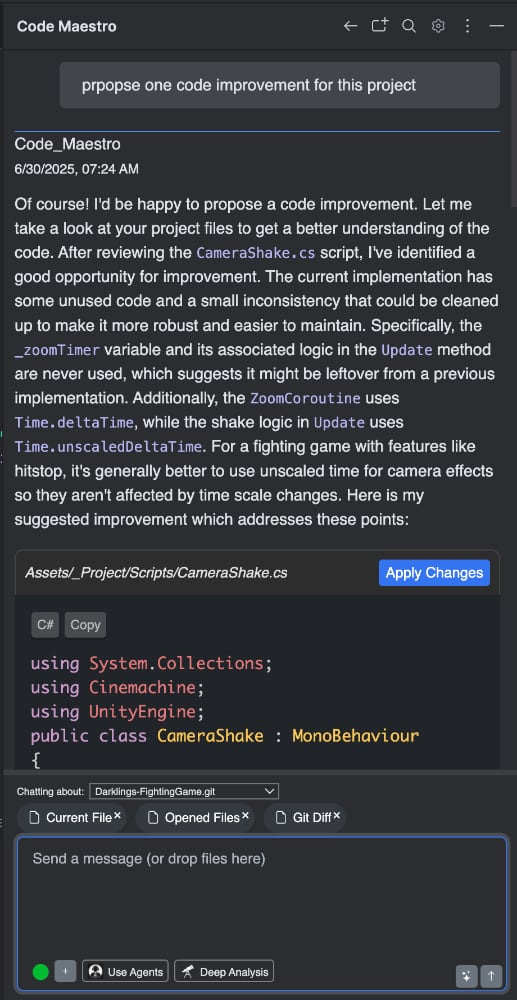
Also, we want to fully support Unreal Engine, and it's very high on our agenda. It's not yet clear, honestly speaking, if we will support Godot, Focus, or some other game engines. I can imagine that we could also support something like Frostbite, again, if there is a nice high-volume contract behind it! We could go the extra mile and say, “Okay, we can support Frostbite.”
And basically, we want to support all possible additional systems. For example, right now we are supporting Git and Mercurial repositories, but that's it. There are many more systems for repository handling, such as Perforce; we can add more support for those. Essentially, we’re going to be adding more and more things to make it all progressively better for professional and semi-professional game developers.
“The whole world turns on agentic systems, and we followed that path. It's very obvious, but it also makes total sense. Unity was our first connector, which is highly polished. Code Maestro can take actions in Unity. Lots of things can be chained”
Alexander Goldybin
But the ultimate goal, which is completely impossible right now due to the limitations of the underlying technologies, especially of the LLMs, is to have something that I would call Lovable for games. Our vision is to democratise game development, so that it’s possible for pretty much everyone to create a nice game – maybe something which is not far away from indie game quality – without knowing that much about coding, artwork, sophisticated game design and so on. [We want him or her to be] a standalone game creator, and be in this vibe creation mode, and see a game evolving and growing.
That's the ultimate goal, but I think it's going to take at least a year, more probably two, until we can see that it can finally become reality. Especially, of course, based not just on HTML5 but on game engines like Unity and Unreal Engine, which are far more sophisticated than Three.js and HTML5 engines, which makes it a bit easier to do something like Tetris for HTML5. But our goal is to support the professional engines with different modes (cloud-based, local-based and so on). We have lots of plans in that regard, but those plans are definitely not on the agenda for tomorrow; it’s something which we will be working on, probably one year from now and later.
Further down the rabbit hole
Some useful news, views and links to keep you going until next time:
So, OpenAI’s GPT-5 launched (and so did Claude Opus 4.1, a day or two before). Sam Altman says it delivers PhD-level expertise across domains, but there’s been user backlash, mostly because of perceived over-promise and under-delivery, but also because of the disruption to workflows from the retirement of older models.
Hasbro’s Roberta Thomson has been appointed new CEO of an internal studio focused on AI.
Jessica Jung, formerly of Niantic, will head up Supercell’s new AI Innovation Lab in San Francisco.
GDEV acquires AI-first studio Light Hour Games for emotional tile-match gaming.
The devcom conference takes place next week. Ahead of that, it surveyed developers and found “a third of devs prefer minimal AI involvement in game production”.
Tickets are available for the first AI Gamechangers Summit in Helsinki on 8th October.
Google’s Genie 3 can create interactive worlds from a single text prompt, and can turn a famous painting into a 3D world you can walk around in.


